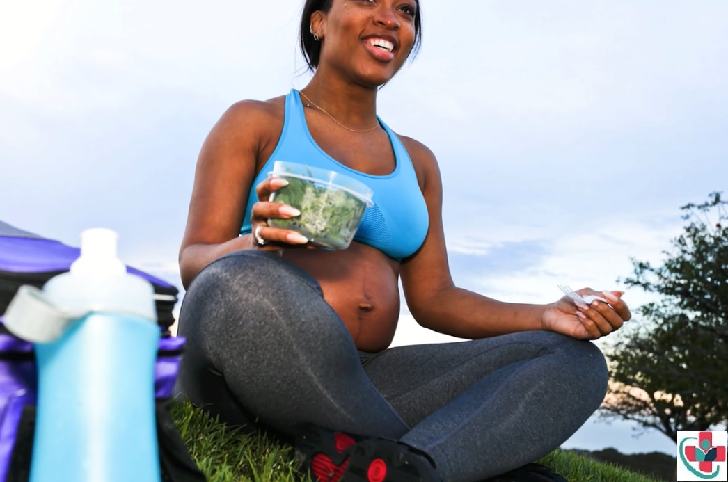During your pregnancy, chances are you'll have some type of craving. When a craving hits, it’s hard—really hard—to be good.
ChooseMyPlate.gov states that any food in moderation is fine during pregnancy. Eating a small amount of "empty" calories—those found in high-sugar foods such as candy bars, cookies, and soft drinks—is OK. However, many expectant mothers eat far more than is healthy. Moderation is the key.
Most often cravings are due to the changing hormones in your body while you're expecting.
Some pregnancy food cravings can undermine your healthy eating habits, but it’s possible to satisfy your cravings and still give yourself the nutrition you and your baby need. If you’re craving something that’s high in calories, fat, or sugar, look for a substitute that satisfies with fewer calories and less fat. The charts below can help.
In addition to the following healthier food substitutions, try adopting the following eating habits for the duration of your pregnancy:
- Eat more frequent mini-meals and snacks. Being less hungry can help curb cravings.
- Begin with a balanced breakfast with at least one whole grain and one fruit. Skipping meals can increase food cravings later in the day.
- Work with your cravings instead of fighting them. Indulge in moderation. A small serving of the food you’re craving might suffice.
- Maintain regular exercise (with your doctor’s approval). Exercise is shown to help reduce cravings.
| Don't eat this: | Eat this: |
|---|---|
| Chocolate candy | A square of dark chocolate |
| Ice cream | Sorbet, sherbet, or juice bars |
| Potato chips | Air-popped popcorn |
YUK! – Dealing with food aversions during pregnancy
While pregnant you might develop aversions to certain foods including nutritious foods that you and your baby might need for good health. If some of your favorite healthy foods seem unappealing, try these substitutions:
| If this makes you want to hurl: | Try this instead: |
|---|---|
| Meat | Other protein sources, such as low-fat yogurt, low-fat milk, low-fat cheeses, beans, nuts, or tofu |
| Any kind of protein | Incorporating or disguising protein in a casserole or stir-fry with a flavorful sauce |
| Dark green leafy vegetables | Beta-carotene-rich fruits, such as peaches, apricots, or tropical fruits |
Fish during pregnancy: To eat, or not to eat?
Fish is low in fat and contains high-quality protein, Omega-3 fatty acids, and other essential nutrients.
The Omega-3 fatty acids in fish play a role in your baby's brain and eye development. But, certain fish, like shark, swordfish, tilefish, and king mackerel, can contain high levels of mercury that can be harmful to your baby. While pregnant you can safely eat up to 12 ounces per week of fish low in mercury (shrimp, salmon, catfish, canned tuna, etc.).*
HEALTHY PREGNANCY CRAVINGS: AVOCADO!
Avocados aren’t just one of those foodie fashions, they walk the talk. They’re pretty, delicious AND they’re really good for you! Especially if you’re pregnant. The Academy of Nutrition & Dietetics lists avocados as a healthful fat that can help women achieve a balanced diet and have a healthy pregnancy. If you’re expecting, talk to your doctor about making them a staple in your pregnancy diet. Here are just some of their benefits:
- They contain naturally good fats which are known to be important for normal growth and development of the baby’s central nervous system and brain.
- They’re a good source of fiber: 3g per 50g serving (about 1/3 of a medium avocado) which will help you feel full faster!
- Fresh avocados provide a good source of folate per serving which is important for developing a baby’s brain function and reducing the risk of premature births and birth defects. That’s why many pregnancy multivitamins are high in folic acid!
Craving Vegetables While Pregnant?
When you are pregnant, you are vulnerable to episodes of bloating and gas. If you greatly increase your vegetable intake due to cravings, you might experience even more gas because of the fiber and certain sugars. They may be all you want to eat, but try to add larger servings into your diet slowly so your body can adjust.
There are ways to optimize your nutrition while satisfying your urges. Here are my top tips:
1. Avoid highly-processed carbohydrates and choose real, whole foods whenever possible. For example, use real ingredients to make a more nutritious version of your favorite dessert.
2. Select complex carbohydrates (think: brown rice, whole-wheat pasta, and whole wheat bread) over refined carbohydrates.
3. Eat every three to four hours to prevent your blood sugar from dropping too low, which will lead to increased sugar cravings.
4. Make sure you are staying hydrated throughout the day! Your fluid needs increase during pregnancy and thirst is often mistaken for hunger. Aim for 10 eight-ounce glasses of water per day.
5. Practice mindful eating. Eliminate distractions while eating and eat slowly. Pay attention to your hunger and satiety cues.
6. Reduce stress. Stress can exacerbate cravings. Ensure you are getting adequate sleep, exercising (if approved by your doctor), and practicing yoga or meditation for stress relief.
And remember, you are not in this alone. Reach out to your provider or a nutritionist for guidance and support as you make these important—and delicious—prenatal food decisions.
